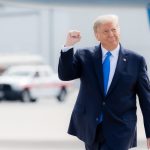The January 6 riot has become a rallying point for the right, especially with ongoing discussions about the fairness—or lack thereof—regarding the treatment of those charged in connection with the events at Capitol Hill. President Donald Trump recently turned heads during a rally, indicating that those accused could expect a pardon, which has surely got many supporters feeling vindicated.
At an energized gathering in Washington, D.C., Trump made his grand remarks, promising that decisions would make attendees at the Capital One Arena “very happy.” His assertion that his future attorney general and FBI director will reverse the so-called “weaponization of our government” and reestablish the “impartial rule of law” was a clear signal that changes are on the horizon. With the promise of a quick decision regarding the “J6 hostages,” it’s safe to say that the crowd was likely buzzing with anticipation.
NOW — Trump issues full pardons for ~1500 January 6th ‘hostages’
“We hope they come out tonight frankly. They’re expecting it”pic.twitter.com/fY7Vtd9ylt
— Chief Nerd (@TheChiefNerd) January 21, 2025
Trump’s commitment to investigate individual cases and act swiftly is not a new development. Just last month, he hinted during an NBC interview that he would prioritize this matter. The former president confirmed that he wouldn’t wait around—he’s looking to spring into action on his first day in office. For him, it seems as though the calendars of justice are long overdue. After all, as he pointed out, those individuals have been languishing in conditions deemed unfit for human habitation for years now.
The political landscape is not entirely without its dissenting voices, however. Vice President J.D. Vance made headlines of his own when he clarified that not all participants from January 6 would receive a pardon. According to Vance, things are straightforward when it comes to distinguishing between the peaceful protesters and the violent offenders. He underscored that the first category deserves a pardon, while those who committed acts of violence should find no relief. This proclamation naturally opens up a can of worms regarding what constitutes “violence” and where the lines are drawn.
As the political drama unfolds, it becomes increasingly clear that the left is not about to give in gracefully. The potential pardons for January 6 participants could escalate tensions and reignite debates about law enforcement and justice in America. Nevertheless, a clear call is heard from many corners of the right: recognize those who stood for their beliefs without resorting to violence and restore their dignity in a system that has treated them harshly. It appears that the January 6 narrative will continue to be a flashpoint in the ongoing saga of American politics.




